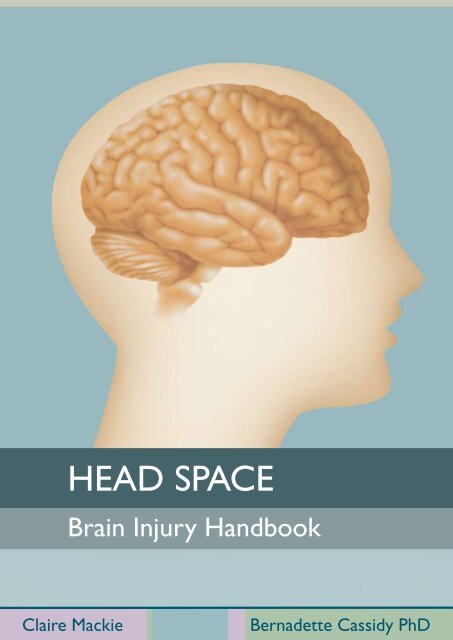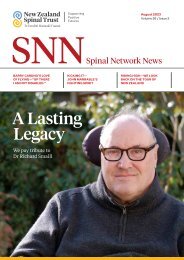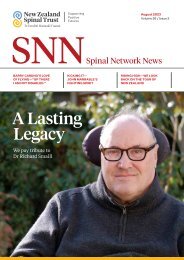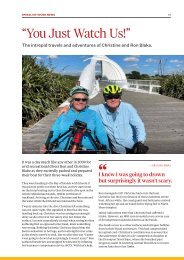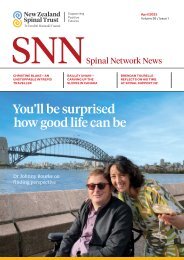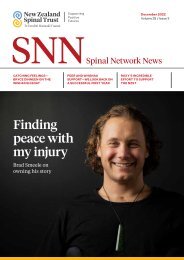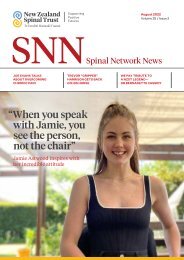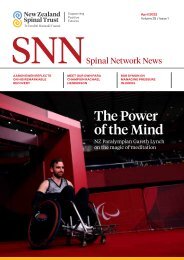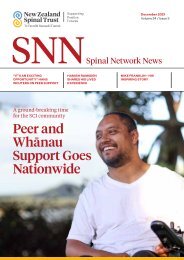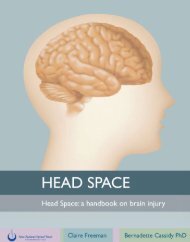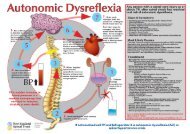You also want an ePaper? Increase the reach of your titles
YUMPU automatically turns print PDFs into web optimized ePapers that Google loves.
HEAD SPACE<br />
Brain Injury Handbook<br />
Claire Mackie<br />
Bernadette Cassidy PhD
Foreword<br />
by<br />
Acknowledgements<br />
We wish to acknowlege the generous support, direction and encouragement of the<br />
Brain Injury Association Canterbury, both staff and members. We would also like to<br />
acknowlege the support of; Sue Wilson, Sir Tim Wallace, Barbara Freeman, Jock Vennell,<br />
Mike St John.............<br />
1
Guide to the Handbook<br />
Introduction<br />
A brief overview of a brain injury and what<br />
to expect following your brain injury.<br />
Physical<br />
Physical effects you may experience after<br />
your brain injury.<br />
Thinking<br />
(Cognitive)<br />
Problems with thinking and communication<br />
you may experience as a result of your<br />
brain injury.<br />
Emotions<br />
Changes in mood and behaviour you may<br />
experience after a brain injury.<br />
Life after<br />
brain injury<br />
Getting back into your community and<br />
adjusting to life after a brain injury.<br />
GUIDE TO CHAPTER CONTENTS<br />
Headaches<br />
Page 23<br />
This is a visual guide<br />
to each chapter’s<br />
contents.<br />
In each of the chapter contents,<br />
there will be a picture to show<br />
you which part of your brain<br />
has been affected.<br />
Guide to page number<br />
and chapter contents.<br />
2
Chapter Contents<br />
1 .............. Chapter 1 - Forward and Acknowledgements<br />
2 .............. Guide to the Handbook<br />
3 .............. Contents<br />
5 .............. Introduction<br />
6 .............. Effects of a Brain Injury<br />
7 .............. Coma and Glasgow Coma Scale<br />
8 ............... Post Traumatic Amnesia<br />
9 .............. Types of Brain Injury<br />
12 .............. Left and Right Brain<br />
13 .............. How the Brain Works<br />
14 .............. Frontal Lobe Damage<br />
15 .............. Temporal Lobe Damage<br />
16 .............. Parietal Lobe Damage<br />
17 .............. Occipital Lobe Damage<br />
18 .............. Cerebellum Damage<br />
19 .............. Brain Stem Damage<br />
20.............Chapter 2 - Physical Effects of a Brain Injury<br />
21 .............. Fatigue and Tiredness<br />
24 .............. Headaches<br />
26 .............. Seizures<br />
29 .............. Movement, Balance, Co-ordination and Dyspraxia<br />
31 .............. The 5 Senses: Touch, Smell, Taste, Vision and Hearing<br />
33 .............. Bladder and Bowel Issues<br />
35 ............ Chapter 3 - Thinking (cognitive) Symptoms<br />
36 .............. Vision and Perception Issues<br />
38 .............. Communication Issues<br />
40 .............. Planning, Organizing and Problem-solving<br />
42 .............. Attention and Concentration<br />
44 .............. Memory<br />
3
Chapter Contents<br />
47 ............ Chapter 4 - Emotional issues<br />
48 .............. Anger, Frustration, Depression and Anxiety<br />
51 .............. Sexual Issues<br />
53 .............. Behaviour and Self-centredness<br />
55 .............. Lack of Motivation<br />
57 .............. Emotional Extremes<br />
59 ............ Chapter 5 - Life Issues<br />
60 .............. Brain Injury in New Zealand - Statistics<br />
61 .............. The Rehabilitation Team<br />
64 .............. Family/Relationships<br />
71 .............. Getting Back to Work<br />
75 .............. Driving After a Brain Injury<br />
79 .............. Nutrition / Alcohol<br />
82 .............. Exercise / Brain Gym<br />
85 .............. Socialising / Recreation<br />
88 .............. Resources<br />
92 Chapter 6 - Personal Journeys<br />
93 .............. Mike<br />
95 .............. Sue<br />
96 .............. Cate<br />
98 .............. Graeme<br />
99 .............. Elizabeth and Merv<br />
100.............. Paul<br />
102.............. Cecile<br />
(ORGANISER IN FOLD OUT AT BACK OF BOOK)<br />
4
Introduction<br />
Brain injury occurs when the brain’s tissue is damaged<br />
or is not working properly. Anything that can damage<br />
brain tissue can cause a brain injury. Brain injuries can<br />
be the result of a blow to the head, such as from a fall,<br />
sports injury, car accident, an assault, cycling or from<br />
any other outside influence.<br />
There are other ways in which the brain may suffer an<br />
injury without a blow to the head. For example, the<br />
brain can lose its blood supply or a blood vessel can break so that bleeding<br />
into the brain tissue occurs. This is usually referred to as a ‘stroke’. A stroke<br />
is one of the most frequent causes of brain injury in older people. Other<br />
causes of injury to the brain can be a drug overdose, a tumour, an infection,<br />
a lack of oxygen or chemical poisoning.<br />
Sometimes the term ‘head injury’ is used instead of brain injury. This can be<br />
misleading as a head injury can include other injuries to the head, such as jaw<br />
or skull fractures, which may not involve the brain.<br />
This handbook is concerned with injuries to the brain and will refer to these<br />
as ‘brain injuries’.<br />
Clinical identification of a brain injury includes<br />
one or more of the following:<br />
• Confusion or disorientation<br />
• Loss of consciousness<br />
• Post-traumatic amnesia<br />
5
Effects of a Brain Injury<br />
The effects of a brain injury are wide ranging<br />
and may result in the following:<br />
Physical disabilities<br />
Sensory disabilities (e.g. sight, smell)<br />
Personality changes<br />
Thinking (cognitive) disabilities (e.g. difficulty thinking clearly, planning<br />
and following through, memory problems)<br />
Difficulty expressing or understanding language<br />
Many people who have a brain injury continue to have ongoing<br />
problems which may include some of the following:<br />
Aggression<br />
Depression<br />
Anxiety<br />
Impulsiveness<br />
Mood swings<br />
Poor concentration<br />
Difficulty with problem-solving<br />
Passivity<br />
Socially inapropriate behaviour<br />
Changes in thinking processes<br />
Loss of memory<br />
6
Coma and<br />
Glasgow Coma Scale<br />
Eyes<br />
Glasgow Coma Scale<br />
Verbal<br />
Brain injuries are usually classified<br />
according to severity. They can be mild,<br />
moderate, or severe. When a brain injury<br />
occurs, two assessments are used to<br />
measure the severity: the Glasgow Coma<br />
Scale (GCS) and the Duration of Post-<br />
Traumatic Amnesia (PTA).<br />
Post-Traumatic Amnesia refers to the<br />
time between injury and the recovery of<br />
full memory for day-to-day events. The<br />
Glasgow Coma Scale is the most widely<br />
used scoring system for measuring the<br />
level of consciousness following traumatic<br />
brain injury. GCS has three parts: an<br />
assessment of eye opening, best motor<br />
response and best verbal response.<br />
1 2 3 4 5 6<br />
Does not<br />
Opens eyes in<br />
Opens eyes in Opens eyes<br />
open eyes<br />
response to painful<br />
N/A<br />
N/A<br />
response to voice spontaneously<br />
stimuli<br />
Makes no<br />
sounds<br />
Incomprehensible<br />
sounds<br />
Utters inappropriate<br />
words<br />
Confused,<br />
disoriented<br />
Oriented, converses<br />
normally<br />
N/A<br />
Motor<br />
Makes no<br />
movements<br />
Reaction to<br />
painful stimuli<br />
Abnormal flexion to<br />
painful stimuli<br />
Flexion / Withdrawal<br />
to painful stimuli<br />
Localizes painful<br />
stimuli<br />
Obeys<br />
commands<br />
A scoring system is used, with the lowest score being 3 and the<br />
highest 15. For example, a score of 8 or less would be regarded as<br />
a severe brain injury resulting in a coma state; a score of 9 to 12<br />
would indicate a moderate brain injury; and a score of 13 to 15<br />
would indicate a mild brain injury.<br />
3 4 5 6 7 8 9 10 11 12 13 14 15<br />
severe injury moderate injury mild injury<br />
7
Post-Traumatic Amnesia (PTA)<br />
If you are in a coma as a result of a brain injury,<br />
afterwards you may have Post Traumatic Amnesia<br />
(PTA). Even mild concussion can cause a short period<br />
of Post Traumatic Amnesia.<br />
Someone emerging from a coma does not just wake<br />
up like in the movies, they go through a gradual<br />
process of regaining consciousness. This stage of recovery may last for<br />
hours, days or weeks.<br />
This may be a very confusing time for you. You may not have any idea<br />
of time, talking may be difficult and you may be very tired. Behavioural<br />
changes can also affect you. For example, some people become passive,<br />
or aggressive, abusive and agitated after being in a coma during the PTA<br />
stage. Some people liken PTA to being in a dream-like state.<br />
Some medical professionals believe that the duration of PTA is the best<br />
indicator of the severity of a brain injury.<br />
You will have little awareness of these behavioural and cognitive<br />
impairments and usually will remember nothing of what happened<br />
during PTA, even though you were fully awake. The good news is that<br />
PTA does not last for ever.<br />
Symptoms of Post-Traumatic Amnesia:<br />
No idea of time<br />
Talking may be difficult<br />
You may be tired<br />
Your behaviour may change - aggressive, abusive,<br />
agitated<br />
8
Types of Brain Injury<br />
Many terms are used to describe the different types of brain injuries,<br />
the severity of brain injuries and the causes of brain injuries. Below<br />
are some of the more common terms used.<br />
Concussion:<br />
This is the most common and least serious type of<br />
traumatic brain injury. It is usually as a result of a direct<br />
blow to the head, or when the brain is shaken. It is not<br />
usually associated with penetrating injuries to the head.<br />
Concussion can also be due to a fall or sports injury<br />
(e.g. a rugby game).<br />
Acquired brain injury:<br />
This term is used to describe any damage to the brain not present at birth<br />
(for example, from a car accident or blow to the head).<br />
Traumatic brain injury:<br />
Anoxic brain injury occurs when the brain does not receive<br />
oxygen for several minutes or longer. Cells in the brain<br />
need oxygen to survive and function.<br />
Hypoxic brain injury results when the brain does not<br />
receive enough oxygen. An hypoxic injury is not as severe<br />
as an anoxic injury, but brain cells can still die from a lack<br />
of oxygen.<br />
9
Types of Brain Injury<br />
Mild brain injury<br />
A mild brain injury is when there is trauma to the head.<br />
At least one of the following symptoms needs to be<br />
present for a mild brain injury:<br />
A period of loss of consciousness<br />
(no more than 30 minutes)<br />
Loss of memory<br />
Feeling, dazed, disorientated<br />
or confused<br />
Initial Glasgow Coma Scale score of 13-15<br />
Post-Traumatic Amnesia not longer<br />
than 24 hours<br />
Moderate brain injury<br />
A moderate brain injury is more severe than a mild<br />
brain injury with a Glasgow Coma Scale score of 9 -<br />
13. Confusion lasts from days to weeks and physical,<br />
thinking and/or behavioural issues can last for months.<br />
In some cases they may be permanent.<br />
Severe brain injury<br />
A severely brain injured person has a Glasgow Coma<br />
Scale score of 8 or less. This person is generally in a<br />
prolonged unconscious state and there are substantial<br />
physical, behavioural and/or thinking issues as a result<br />
of the injury.<br />
10
Types of Brain Injury<br />
Open head injury (penetration)<br />
When an object enters the brain, such as a sharp object.<br />
Coup/contrecoup injury<br />
A coup injury occurs at the site of impact. A contrecoup<br />
injury is when there is damage to a part or region to<br />
the brain that is opposite to that at which the blow is<br />
received, often causing rupture of the affected parts.<br />
Contusion<br />
A contusion is bruising (bleeding) on the brain caused by<br />
small blood vessels leaking into brain tissue. A contusion<br />
occurs as a result of trauma to the brain and in many<br />
cases is more serious than a concussion.<br />
Haematoma<br />
A hamatoma is a collection of blood as a result of internal<br />
bleeding from trauma or an aneurysm. An aneurysm is<br />
a widening and possible rupture of an artery, vein or the<br />
heart itself.<br />
Diffuse axonal injury<br />
A diffuse axonal injury can be caused by violent shaking<br />
of the head. The movement of the brain inside the skull<br />
causes extensive tearing of nerve tissue which can cause<br />
brain chemicals to be released, causing additional injury.<br />
11
Left and Right Brain<br />
The brain is divided into two parts or ‘hemispheres’. The left side<br />
of the brain controls the right side of the body and the right side<br />
of the brain controls the left side of the body.<br />
The right side of the brain takes visual information and interprets<br />
it creatively. The left is the logical and analytical side. It takes the<br />
information collected by the right side and analyses and applies<br />
language to it.<br />
People with right side injuries often deny having an injury as the<br />
brain does not realise that something is missing. If you have an<br />
injury to the left side, you may know something is wrong. You<br />
may find it difficult to solve complex problems and consequently<br />
you may feel depressed because of this.<br />
Left Side of Brain<br />
The left side of the brain controls:<br />
Right Side of Brain<br />
The right side of the brain controls:<br />
Movement of right side of body<br />
Problem-solving<br />
Expression in words<br />
Mathematical calculation<br />
Seeing in black and white<br />
Speech and language control<br />
Reading and writing control<br />
Organisation skills<br />
Movement of left side of body<br />
Holistic thought<br />
Intuition and emotional expression<br />
Creativity and thinking<br />
Visual memory, drawing, and music skills<br />
Spatial visualisation<br />
Seeing in colour<br />
Using pictures, not words<br />
1 + 1<br />
12
How the Brain Works<br />
There are 100 billion nerve cells in your brain. On each nerve cell are<br />
two branches:<br />
Dendrites, which receive incoming messages from other cells<br />
in the form of an electrical impulse.<br />
Axons, which carry outgoing signals to other cells.<br />
Interconnected, they provide super-fast communication, allowing the<br />
brain to send messages from one side to the other, which lets you<br />
move and make decisions. This is done by a chemical that is shot from<br />
the axon across a gap (synapse) where it triggers another cell to send<br />
a message.<br />
An injury to your brain can destroy or damage these nerve cells, which<br />
means that some messages will not get through or may get scrambled<br />
along the way.<br />
13
Frontal Lobe Damage<br />
COMMON EFFECTS OF FRONTAL LOBE DAMAGE.<br />
Loss of spontaneity<br />
Personality changes<br />
Sexually uninhibited<br />
Inflexible thinking<br />
Repetition of words, gestures or acts<br />
Mood - *Aggressive and explosive anger<br />
Initiative and planning -<br />
*Difficulty sequencing<br />
*Problem-solving<br />
Motor function -<br />
*Paralysis and loss of simple movement<br />
Memory - *Selective attention and concentration<br />
Language - *Decrease of verbal expression<br />
14
Temporal Lobe Damage<br />
COMMON EFFECTS OF TEMPORAL LOBE DAMAGE.<br />
Language - *Difficulty recognising words<br />
*Loss of inhibition while talking<br />
Memory - *Difficulty recognising faces<br />
*Difficulty identifying, locating and categorizing objects<br />
*Short-term memory loss<br />
Mood - *Increased aggressive behaviour<br />
*Increase or decrease in sexual desire<br />
Selective attention -<br />
*Decreased recall of verbal and visual content<br />
15
Parietal Lobe Damage<br />
COMMON EFFECTS OF PARIETAL LOBE DAMAGE.<br />
Limb / facial movements affected<br />
Loss of spatial awareness<br />
Changes in feeling / touch<br />
Object-naming problems<br />
Right/left confusion<br />
Writing and maths difficulties<br />
Difficulty with multi-tasking<br />
Voluntary movement -<br />
*Problems with eye-hand coordination<br />
*Lack of awareness of body parts<br />
Visual attention -<br />
*Reading and drawing problems<br />
*Inability to focus visual attention<br />
16
Occipital Lobe Damage<br />
COMMON EFFECTS OF OCCIPITAL LOBE DAMAGE.<br />
Vision -<br />
*Difficulty identifying colours and recognising drawn objects<br />
*Blind spots<br />
*Hallucinations<br />
*Visual distortions<br />
*Not seeing some words<br />
*Difficulty reading and writing<br />
*Difficulty recognising the movement of an object<br />
*Difficulty visually locating objects<br />
17
Cerebellum Damage<br />
COMMON EFFECTS OF CEREBELLUM DAMAGE.<br />
Difficulty with balance<br />
Equilibrium -<br />
*Tremors<br />
*Dizziness<br />
Muscle tone -<br />
*Inability to grasp objects<br />
*Slurred speech<br />
Movement -<br />
*Problems with fine movement and coordination<br />
*Problems with mobility<br />
*Difficulty with rapid movements<br />
18
Brain-Stem Damage<br />
COMMON EFFECTS OF BRAIN-STEM DAMAGE.<br />
Problems with the physical act of talking<br />
Difficulty swallowing food and liquid<br />
Decreased breathing capacity<br />
Sleeping difficulties<br />
Problems with balance and movement<br />
Problems with blood pressure and sweating<br />
Digestion and temperature problems<br />
19
Chapter Contents<br />
Fatigue and Tiredness<br />
Page 21<br />
Headaches<br />
Page 24<br />
Seizures<br />
Page 26<br />
Movement, Balance,<br />
Co-ordination and Dyspraxia<br />
Page 29<br />
The Five Senses: Touch, Smell,<br />
Taste, Vision and Hearing<br />
Page 31<br />
Bladder and Bowel Issues<br />
Page 33<br />
20
Fatigue and Tiredness<br />
Why am I tired?<br />
After an injury, your brain uses a lot of the body’s energy to heal and<br />
consequently it needs a lot of sleep to help it recover.<br />
Fatigue is extremely common after a brain injury. The sleep your body<br />
craves may be fragmented and can have little effect on the tiredness you<br />
feel. You may find activities tire you quickly, even ones like reading which<br />
are not that physical but require a lot of mental work.<br />
Fatigue may be caused by damage to the part of the brain that is responsible<br />
for wakefulness, consciousness and sleep rhythm. After a brain injury, it<br />
may take longer to recouperate and ‘recharge’ than prior to your injury.<br />
Ways of coping<br />
Carefully plan activities to avoid doing too much and<br />
be aware of too much stimuli.<br />
Say no to the excessive demands of others. Be open<br />
about your problems with others but don’t go on about<br />
the issues. Beware of sounding like a ‘broken record.’<br />
Plan periods of rest and take naps. Make naps a regular<br />
part of your day and try to have them at the same time<br />
every day.<br />
21
Ways of coping<br />
Do your most demanding activity in the morning when<br />
you have the most mental energy.<br />
Eating a light meal can sometimes help, and drinking<br />
plenty of water.<br />
8pm<br />
Try to establish a set time to go to bed each night and<br />
get up at the same time each day.<br />
walk<br />
nap<br />
read<br />
Vary your daily activities to avoid monotony.<br />
Do I have the<br />
energy?<br />
Pace yourself, do not rush. Learn to stop and think<br />
before you proceed to do an activity. Ask yourself, “Do<br />
I have enough energy to finish? Do I need to break it<br />
down or do it differently?”<br />
Try to avoid doing too much and getting over-tired. A<br />
really busy day can set you back for several days.<br />
When you get tired, expect that tasks will take you<br />
longer to complete.<br />
22


